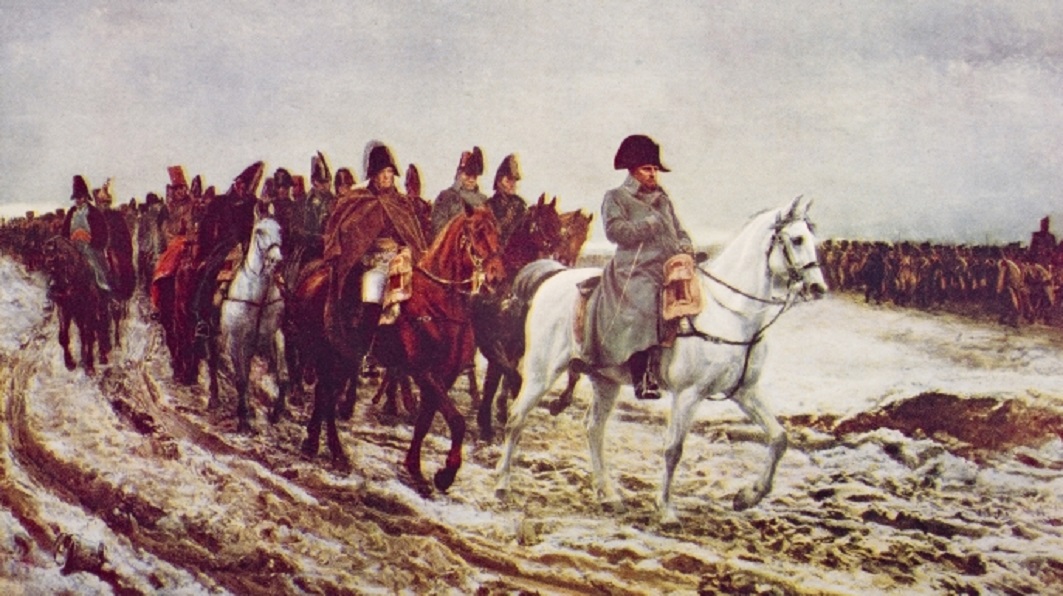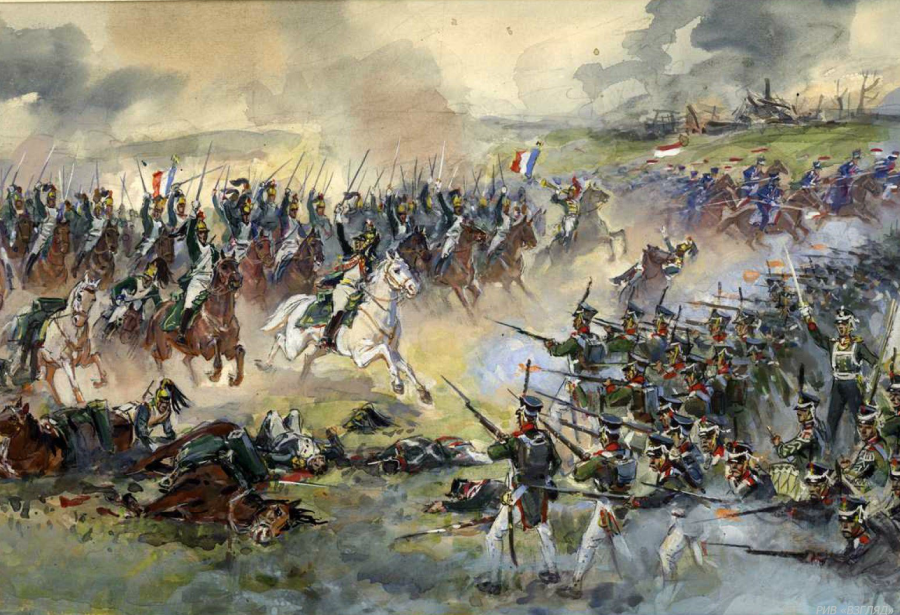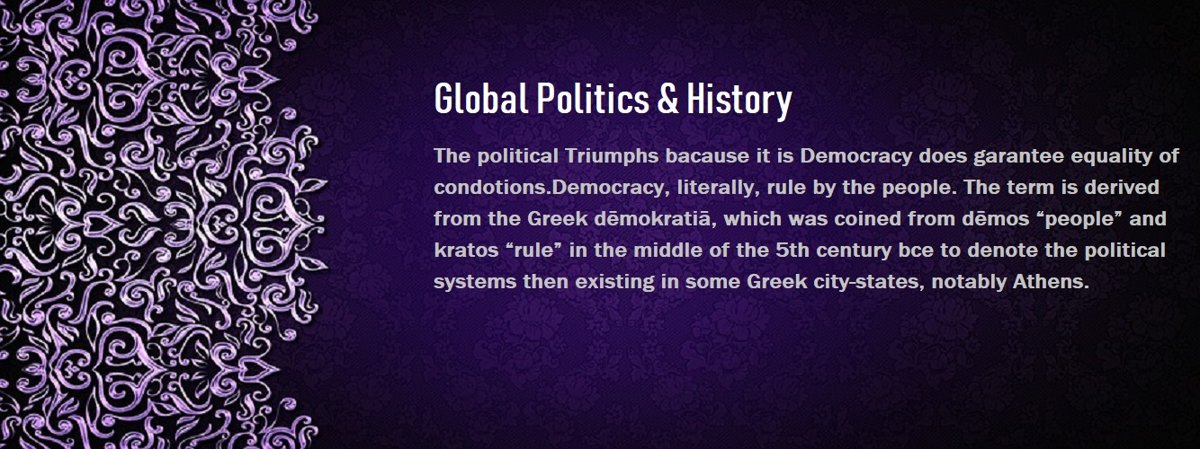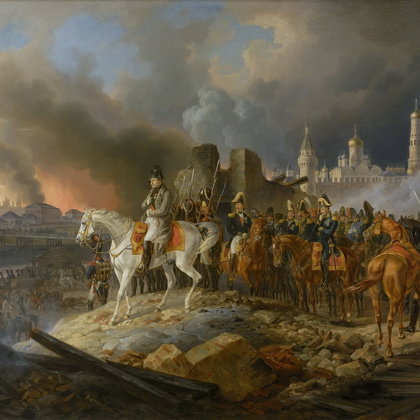FRANCO - RUSSIAN WAR (1812), IN JUNE OF 1812,NAPOLEON BEGAN HIS FATAL RUSSIAN CAMPAIGN,THE REASON FOR NAPOLEON INVADING RUSSIA ,A FIRST SIGNIFICANT MILITARY MISTAKE AND ONE WHICH WAY TO ULTIMATELY COST HIM AN EMPIRE.
 Napoleon had reasons for going to war with Russia. Within the logic of his strategy for domination of Europe, the campaign became all but inevitable.Marshal Ney, One of Bonaparte’s greatest generals.Napoleon Bonaparte is generally regarded as one of history’s top military tacticians. But in 1812, he committed a grave error by leading his Grande Armée—likely the largest European armed force ever assembled to that point—across the Niemen River into Russia.
Napoleon had reasons for going to war with Russia. Within the logic of his strategy for domination of Europe, the campaign became all but inevitable.Marshal Ney, One of Bonaparte’s greatest generals.Napoleon Bonaparte is generally regarded as one of history’s top military tacticians. But in 1812, he committed a grave error by leading his Grande Armée—likely the largest European armed force ever assembled to that point—across the Niemen River into Russia.
The French invasion of Russia (also known as the Russian Campaign) in 1812 was a turning point in the Napoleonic Wars. The campaign reduced the French and allied invasion forces to a small fraction of their initial strength.The campaign started well as Napoleon and his Grande Armée pushed into Russia and even briefly occupied Moscow. But there the tide turned. As summer turned to winter, his army was forced into a humiliating retreat westward. Only 120,000 of his 500,000 Grande Armée returned home. Its sustained role in Russian culture may be seen in Tolstoy's War and Peace and the Soviet identification with it during the German invasion of 1941-1944.Russia and France were allied in 1807 by the Treaties of Tilsit, which also involved Prussia. Tsar Alexander I of Russia agreed to comply with the Continental System, Napoleon’s attempt to wage economic war on Britain. Alexander supported Napoleon when he went to war with Austria in 1809, sending an army to threaten Austria’s eastern frontier. His foreign minister, Nikolay Rumiantsev, thought that the alliance was in Russia’s interests.Charles Esdaile argues that Napoleon damaged Franco-Russian relations by making too many demands of his ally. He wanted Russia to send troops to the West, and away from Serbia and the Danube, where Russia was fighting the latest in a long series of wars with the Ottoman Empire. Napoleon ignored Russia’s interests and left Alexander feeling that he was regarded as the junior partner in the Alliance.Many Russian were also concerned by King Charles XIII of Sweden’s adoption of Jean-Baptiste Bernadotte, one of Napoleon’s marshals, as his son and heir in May 1810. The Russo-Swedish War of 1808-9 resulted in Sweden losing Finland to Russia. King Gustavus IV, who was considered to be insane, was deposed and replaced by Charles, who was childless and in poor health. Sweden still controlled over half the Baltic coast, including Pomerania, and many Russians feared that Napoleon was trying to encircle Russia.In fact, although Bernadotte had served with Napoleon for many years and he and Joseph Bonaparte were married to sisters, he was not close to the Emperor. Bernadotte was jealous of Napoleon’s success, whilst the Emperor had been angered by Bernadotte’s failure to move his corps to the action at the Battle of Jena-Auerstadt and by his attempt to claim credit for the victory at Wagram. According to Zamoyski, Napoleon once said that he would have had Bernadotte shot three times had they not been related by marriage.A further source of dispute was Napoleon’s desire for an heir. He and the Empress Josephine had failed to have children. Since she had a son and a daughter by her previous marriage, it appeared that this was the fault of the Emperor until he had a son by Maria Walewska, his mistress. Determined to produce a legitimate heir, he decided to divorce the 46-year-old Josephine and marry a younger and royal woman.Napoleon’s first choice was Alexander’s teenage sister, Grand Duchess Anna. Their mother, the Dowager Empress, opposed the intended marriage, as did many leading nobles, who did not want to strengthen ties with France. Alexander was not keen and in February 1810 asked for a two-year postponement because Anna was too young. Napoleon immediately turned his attentions to the Archduchess Marie-Louise, daughter of the Austrian Emperor France I, marrying her on 1 April 1812.Napoleon began his fatal Russian campaign, a landmark in the history of the destructive potential of warfare. Virtually all of continental Europe was under his control, and the invasion of Russia was an attempt to force Tsar Alexander I to submit once again to the terms of a treaty that Napoleon had imposed upon him four years earlier. Having gathered nearly half a million soldiers, from France as well as all of the vassal states of Europe, Napoleon entered Russia at the head of the largest army ever seen. The Russians, under Marshal Kutuzov, could not realistically hope to defeat him in a direct confrontation. Instead, they begin a defensive campaign of strategic retreat, devastating the land as they fell back and harassing the flanks of the French. As the summer wore on, Napoleon's massive supply lines were stretched ever thinner, and his force began to decline. By September, without having engaged in a single pitched battle, the French Army had been reduced by more than two thirds from fatigue, hunger, desertion, and raids by Russian forces.
 Napoleon was at the height of his power with virtually all of continental Europe either under his direct control or held by countries defeated by his empire and under treaties favorable to France. No European power on the continent dared move against him.The 1809 Austrian war treaty had a clause removing Western Galicia from Austria and annexing it to the Grand Duchy of Warsaw. Russia saw this as against its interests and as a launching point for an invasion of Russia. In an attempt to gain increased support from Polish nationalists and patriots, Napoleon termed this war the Second Polish War.
Napoleon was at the height of his power with virtually all of continental Europe either under his direct control or held by countries defeated by his empire and under treaties favorable to France. No European power on the continent dared move against him.The 1809 Austrian war treaty had a clause removing Western Galicia from Austria and annexing it to the Grand Duchy of Warsaw. Russia saw this as against its interests and as a launching point for an invasion of Russia. In an attempt to gain increased support from Polish nationalists and patriots, Napoleon termed this war the Second Polish War.The blockade had begun in 1806 and had become widespread across Europe but Russia was viewed as being critical to the campaign success. The reason for the invasion was therefore identified by many as an attempt to keep Tsar Alexander I as a supported of the embargo.This is a more likely scenario although an official reason was that the French Emperor had intended to prevent Russia from invading Poland and, as such, the conflict was named as the Second Polish War. In Russia however, it came to be known as the Patriotic War.Napoleon managed to offend both the Russians by his quick change of target, and the Austrians by the speed and lack of courtesy with which he pursued Marie-Louise. According to both Esdaile and Zamoyski, he was not playing a double game; Anna was his first choice, but he wanted to marry a young princess and father an heir as soon as possible. There were some complaints in France about Napoleon breaking his ties to the Revolution by marrying an Austrian archduchess, but this had little political impact.One strong reason for Russian anger with France was the impact of the Continental System. Russia had little industry and had to import many manufactured goods. Alexander wanted to expand Russian trade, but exports fell by 40 per cent in 1806-12, customs revenue from 9 million roubles in 1805 to under 3 million in 1808, the paper currency halved in value in 1808-11 and prices of coffee and sugar rose by as much as five times in 1802-11.Alexander did not leave the Continental System, but he ceased to enforce it. In December 1810 he opened Russian ports to US ships and made tariffs on imports by land, such as French goods, much higher than those on goods, mostly British, coming by sea.Also in December 1810, Napoleon annexed the free ports of Hamburg, Bremen and Lübeck in order to give him greater control over imports into Europe. The next month he took over the Duchy of Oldenburg. Its ruler, Grand Duke Peter, was Alexander’s uncle, and Peter’s heir was married to one of Alexander’s sisters, Grand Duchess Catherine.By 1811, Alexander was preparing for war with France. He offered to restore the Kingdom of Poland, but the Poles did not want a war that would take place mainly on their territory, and many of them preferred Napoleon to Alexander. Attempts to sign military alliances with Austria, Prussia and Sweden failed. Alexander decided that Russia would not start a war with France.Nonetheless, it was clear that unless the Russians engaged the French Army in a major battle, Moscow would be Napoleon's in a matter of weeks. The Tsar insisted upon an engagement, and on September 7, with winter closing in and the French army only 70 miles (110 km) from the city, the two armies met at Borodino Field. By the end of the day, 108,000 men had died--but neither side had gained a decisive victory. Kutuzov realized that any further defense of the city would be senseless, and he withdrew his forces, prompting the citizens of Moscow to began a massive and panicked exodus. When Napoleon's army arrived on September 14, they found a city depopulated and bereft of supplies, a meagre comfort in the face of the oncoming winter. To make matters much, much worse, fires broke out in the city that night, and by the next day the French were lacking shelter as well.After waiting in vain for Alexander to offer to negotiate, Napoleon ordered his troops to begin the march home. Because the route south was blocked by Kutuzov's forces (and the French were in no shape for a battle) the retreat retraced the long, devastated route of the invasion. Having waited until mid-October to depart, the exhausted French army soon found itself in the midst of winter--in fact, in the midst of an unusually early and especially cold winter. Temperatures soon dropped well below freezing, cossacks attacked stragglers and isolated units, food was almost non-existent, and the march was five hundred miles. Ten thousand men survived. The campaign ensured Napoleon's downfall and Russia's status as a leading power in post-Napoleonic Europe. Yet even as Russia emerged more powerful than ever from the Napoleonic era, its internal tensions began to increase.Peace between Russia and France had its advantages. It allowed the two great states to carve up much of Europe between them and focus on other opponents. However, to the French, the alliance with Russia was disappointing. The Russians seldom gave the French Emperor what he wanted.One of the most powerfully symbolic issues, if the least strategically significant, was finding Napoleon, a wife. His first marriage to Josephine had not led to children. The Emperor had no heir, and so the couple agreed to divorce so he could remarry and ensure the Napoleonic line.This was a chance for a diplomatic marriage that could consolidate French power and the royal legitimacy of Napoleon’s children. However, when he suggested to the Russians one of their princesses might become his bride, he received a frosty reception. It was a setback to his plans and a sign Russia was not committed to their partnership in the long term.
 Napoleon, marched into Moscow with his army largely intact and retreated only because the citizens of Moscow burned three-fourths of the city, depriving the army of food and supplies. The harsh Russian winter then devastated the army as it retreated. Napoleon now made his third mistake of the operation. Most of the Russian army was still north-west of Smolensk, and the French could have bypassed the city, advanced further east and cut the roads to Moscow.Napoleon was given one more chance when the two Russian armies became separated. Junot nearly got between the two Russian forces, but moved too slowly, while a French attack on the Russian rearguard at Valutino (19 August) failed.
Napoleon, marched into Moscow with his army largely intact and retreated only because the citizens of Moscow burned three-fourths of the city, depriving the army of food and supplies. The harsh Russian winter then devastated the army as it retreated. Napoleon now made his third mistake of the operation. Most of the Russian army was still north-west of Smolensk, and the French could have bypassed the city, advanced further east and cut the roads to Moscow.Napoleon was given one more chance when the two Russian armies became separated. Junot nearly got between the two Russian forces, but moved too slowly, while a French attack on the Russian rearguard at Valutino (19 August) failed.

